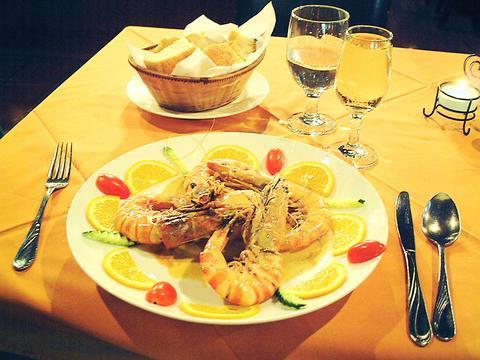The last time we reviewed Papa Giovanni's was in April of 2000 when there were rumors that Papa and family had opened a bakery adjacent the restaurant.
We returned this time on rumors that the bakery has closed and on more troubling reports of disgruntled patrons.
Because the Taipei Times has praised Papa and staff in past reviews, the news of unhappy clientele was ? well, news. Forumosa.com, an Internet site popular with Taiwan's expatriate community, has dozens of postings regarding Papa Giovanni's under its "restaurants, bars and clubs" forum.

PHOTO: DAVID MOMPHARD, TAIPEI TIMES
The postings almost unanimously decry the restaurant's poor service, high prices and Papa's "attitude." One post said he left the restaurant with "the distinct impression that it could only have been due to direst economic necessity that the owner stooped to allow me into his establishment."
But on my visit there Tuesday night I watched members of the Giovanni family walk most every patron to the door to say goodnight. I saw the wait staff attentively filling water glasses and clearing plates. Papa himself took my order and ended every sentence with "sir."
As far as I could determine during this single visit -- which was unannounced -- the rumors of Papa's despise are greatly exaggerated. Of the complaints I've read or been told, I share only one: the prices are too high. My order of a small caesar salad, king prawns in bourbon sauce, a glass of house white wine and tiramisu cost over NT$1,500. The small caesar alone -- which I ordered on Papa's suggestion -- cost NT$320. It had no romaine lettuce, no croutons, very little parmesan and not the slightest hint of anchovy.
The king prawns were indeed kingly and the bourbon sauce was delicious, but at NT$680 for four you'd have to be a king to order them a second time. You can find equally large and fresh prawns in most of Taipei's night markets for half the price -- with the caveat being that they're covered in mayonnaise, not bourbon sauce. No whines regarding the house white wine (NT$180); I should have had a second glass instead of the tiramisu (NT$180).
Talking with Papa on my way out, I asked what became of the bakery. He explained that he closed it because, as everything was baked after hours, he couldn't control the quality. He also hinted that there may not have been a market for his European-styled products. "Chinese people, they like soft breads," he said.
As for the complaints about him and his restaurant, he said he was unaware of the online postings and didn't seem overly concerned. "People sometimes don't like something."

Towering high above Taiwan’s capital city at 508 meters, Taipei 101 dominates the skyline. The earthquake-proof skyscraper of steel and glass has captured the imagination of professional rock climber Alex Honnold for more than a decade. Tomorrow morning, he will climb it in his signature free solo style — without ropes or protective equipment. And Netflix will broadcast it — live. The event’s announcement has drawn both excitement and trepidation, as well as some concerns over the ethical implications of attempting such a high-risk endeavor on live broadcast. Many have questioned Honnold’s desire to continues his free-solo climbs now that he’s a

As Taiwan’s second most populous city, Taichung looms large in the electoral map. Taiwanese political commentators describe it — along with neighboring Changhua County — as Taiwan’s “swing states” (搖擺州), which is a curious direct borrowing from American election terminology. In the early post-Martial Law era, Taichung was referred to as a “desert of democracy” because while the Democratic Progressive Party (DPP) was winning elections in the north and south, Taichung remained staunchly loyal to the Chinese Nationalist Party (KMT). That changed over time, but in both Changhua and Taichung, the DPP still suffers from a “one-term curse,” with the

Jan. 26 to Feb. 1 Nearly 90 years after it was last recorded, the Basay language was taught in a classroom for the first time in September last year. Over the following three months, students learned its sounds along with the customs and folktales of the Ketagalan people, who once spoke it across northern Taiwan. Although each Ketagalan settlement had its own language, Basay functioned as a common trade language. By the late 19th century, it had largely fallen out of daily use as speakers shifted to Hoklo (commonly known as Taiwanese), surviving only in fragments remembered by the elderly. In

William Liu (劉家君) moved to Kaohsiung from Nantou to live with his boyfriend Reg Hong (洪嘉佑). “In Nantou, people do not support gay rights at all and never even talk about it. Living here made me optimistic and made me realize how much I can express myself,” Liu tells the Taipei Times. Hong and his friend Cony Hsieh (謝昀希) are both active in several LGBT groups and organizations in Kaohsiung. They were among the people behind the city’s 16th Pride event in November last year, which gathered over 35,000 people. Along with others, they clearly see Kaohsiung as the nexus of LGBT rights.